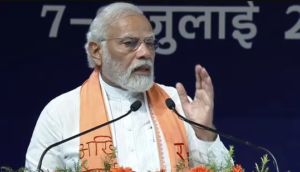- Entire focus of NEP is on making children skilled according to their talents
- Steps on for big overhaul of education infrastructure in the country
- The PM emphasizes on the attitude of ‘lab to land’.
- India can emerge as a big centre of global education
- National Education Policy’ has given us a tool to realize innumerable possibilities”
IndiGlobal Media

In his address, the Prime Minister said that “the basic premise of the National Education Policy is to take education out of narrow thinking and connect it with the modern ideas of the 21st century.
Modi stressed that “we should not only prepare degree-holding youth but also give human resources needed for the country to move forward. Our teachers and educational institutions have to lead this resolution.” For creating a New India, the Prime Minister stressed that a new system and modern processes are critical.
The Prime Minister noted that in areas like space technology, earlier the government had monoploy, now a new world is being created for the youth through private players. Sectors that used to be closed to women are now showcasing their talent.
The Prime Minister also talked of a big overhaul of education infrastructure in the country. Many new colleges, universities, IITs and IIM have come up in the country. There has been an increase of 55 per cent in the number of medical colleges after 2014, he informed. The Common Entrance Test for universities will bring ease and equality to university admissions. “The National Education Policy is now opening the way for studies in the mother tongue.
The Prime Minister expressed confidence that India can emerge as a big centre of global education. He said guidelines have been issued to prepare Indian higher education as per international standards. Special offices have been established in 180 universities for international affairs of the institutions. He asked the experts to be aware of the international practices in the field.
The Prime Minister emphasized the importance of practical experience and fieldwork and asked for an attitude of ‘lab to land’. He asked the academics to validate their experience with verified testing. He asked for evidence-based research. He also asked for research on the demographic dividend of India and find ways to best utilize this and find solutions for the ageing societies of the world. Similarly, resilient infrastructure is another area of research. “National Education Policy’ has given us a tool to realize innumerable possibilities which were not available earlier. We need to use it fully, he concluded.
During the three-day Shiksha Samagam, panel discussions on nine themes identified for Higher Education under NEP 2020 will be conducted. These themes are Multidisciplinary and Holistic Education; Skill Development and Employability; Research, Innovation and Entrepreneurship; Capacity Building of Teachers for Quality Education; Quality, Ranking and Accreditation; Digital Empowerment and Online Education; Equitable and Inclusive Education; Indian Knowledge System; and Internationalization of Higher Education.
Governor of Uttar Pradesh Anandiben Patel, Chief Minister of Uttar Pradesh Yogi Adityanath, Union Ministers Dharmendra Pradhan, Annapurna Devi, Dr Subhas Sarkar, Dr Rajkumar Ranjan Singh, State Ministers, educationists and other stakeholders were present